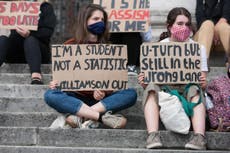Young people have put their lives on hold – they expect more than hollow words from the government
The urgency of our current crisis demands an imaginative stimulus package for Generation Covid, which could include skills training and reduction or reimbursement of university tuition fees


Your support helps us to tell the story
From reproductive rights to climate change to Big Tech, The Independent is on the ground when the story is developing. Whether it's investigating the financials of Elon Musk's pro-Trump PAC or producing our latest documentary, 'The A Word', which shines a light on the American women fighting for reproductive rights, we know how important it is to parse out the facts from the messaging.
At such a critical moment in US history, we need reporters on the ground. Your donation allows us to keep sending journalists to speak to both sides of the story.
The Independent is trusted by Americans across the entire political spectrum. And unlike many other quality news outlets, we choose not to lock Americans out of our reporting and analysis with paywalls. We believe quality journalism should be available to everyone, paid for by those who can afford it.
Your support makes all the difference.Earlier this week, the UK passed the awful milestone of 100,000 Covid deaths. But while we rightly focus on the relentless daily cost of this unfolding tragedy, a different crisis threatens our youth.
If you are 16-25, chances are that you have lost months of face-to-face education, your current job, your future employment prospects, or your independence. For members of my generation, the best-case scenario has been to put our ambitions on hold, move back in with our parents, or else default on rent payments. We are the cohort that may forever be labelled “Generation Covid”. Plunged into economic and social uncertainty, we risk losing hope and opportunity.
According to the Office for National Statistics, 596,000 16-25-year-olds were unemployed between August and October 2020. The share of young people living at home in the same period is the highest ever recorded. Covid has amplified existing trends, such as stagnant labour markets and rising student debt, and young people are therefore suffering from the economic fallout of the pandemic more than other groups.
Relatively few of my generation will lose their lives to this virus, but instead it may strip us of any opportunity to lead productive, fulfilled lives. If the government fails to support this group, the UK risks losing future entrepreneurial innovation, scientific discovery, original artistic production and new ideas. All the government’s talk of “levelling up” will be hollow unless action is taken now.
Although the pandemic seems unprecedented, the world has of course faced huge crises before. But leaders in the past acted decisively in planning for the future. During the Second World War, the government published the Beveridge Report, which laid the foundation for the post-war welfare state and creation of the NHS.
The US invested in its future on an even larger scale. The GI Bill, somewhat less well known in Britain, provided nearly nine million returning veterans with education and employment support. Free university and trade education, unemployment compensation, subsidised mortgages and loans to start new businesses were all provided to returning servicemen. Not only was the bill incredibly popular, but it is now credited with creating post-war economic prosperity, innovation and the rapid growth of the American middle class.
Policy makers should take note. The urgency of our current crisis demands a similarly imaginative stimulus package for Generation Covid.
The package could include skills training for those who have missed face-to-face teaching; reduction or reimbursement of university tuition fees; lost wage assistance for those who are out of work as a result of the pandemic; and subsidised loans and mortgages to help young people purchase homes and start businesses. We have our most economically productive years ahead of us. Whereas provisions like the furlough scheme support economic activity that already exists, a Generation Covid stimulus package would invest in the economy of the future.
The GI Bill was so effective because of the scale of its investment. The UK government might laud its Kickstart Scheme, but it has so far provided fewer than 2,000 work placements to young people on universal credit. Similarly, while the Department for Education’s Get Help with Technology scheme has promised 1.3 million laptops and tablets to disadvantaged school children, the rollout has been slow, with only 700,000 delivered to schools so far. These policies are certainly well intentioned, but will such a piecemeal approach to supporting young people actually result in much real benefit?
A pandemic stimulus package needs to be implemented at scale, with enough visibility to motivate 16-25-year-olds. With mental health problems reportedly affecting 68 per cent of young people during the pandemic, introducing a truly progressive stimulus package would be as much a mentally galvanising exercise as an economic one. If we do not create a sense of hope for the future, we risk losing this generation to virulent strains of apathy and pessimism.
Research suggests that recipients of the GI Bill were 50 per cent more likely to engage civically and be politically active. For a generation whose trust in politicians has been so damaged by Covid-19, the government would do well to try to restore faith and confidence in democracy.
As William Beveridge said in 1942: “A revolutionary moment in the world’s history is a time for revolutions, not for patching.” By recognising this crisis as a revolutionary moment, the government has a unique opportunity to introduce proper social welfare reforms to protect the young and build the economy of tomorrow.




Join our commenting forum
Join thought-provoking conversations, follow other Independent readers and see their replies
Comments